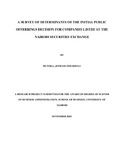| dc.description.abstract | One of the most momentous events in the life of corporations is going public through the issue of shares in a Stock Exchange to the public. Being a very complex, costly and time-consuming process, a public offering requires, from a company that decided to list its shares, a thorough analysis and consideration of various aspects. The decision to list/ or not, cannot be generalized into one single determinant for all companies: different characteristics of firms and external environments play a vital role in identifying the most beneficial option. This paper examines the determinants influencing the IPO issue decision by enterprises under the conditions in force on the Nairobi Stock market. In the study, we asked CFOs of Kenyan enterprises, divided into two groups, to formulate their insights in the area of going public. The first group consisted of the entities that have previously executed an initial public offering, the second one included the entities that have not executed an IPO (but meet all the requirements of conducting an IPO.) This paper had a two-pronged focus; it explored the motives for Initial Public Offerings (IPOs) for companies listed at the NSE; then it catalogued the circumstances and conditions that discourage would be IPO candidates from completing an IPO issue in Kenya. To achieve the study objectives, an anonymous survey was conducted of a matched sample of ‗IPO companies‘ listed on NSE and ‗non-IPO firms‘, during the period 2000- 2014.The study revealed that the most common reason for conducting an IPO at NSE was to meet financing needs, followed by the push given by favourable market conditions, and lastly, as an exit strategy that enables founder entrepreneurs to encash their investments. The quest to reduce cost of capital received less weight as an IPO motivator. When the impediments to going public were evaluated, the desire to maintain decision making control was the most frequently cited justification. The second most common deterrence was prevailing bad market conditions. The need to avoid EPS dilution, and low price of stock were viewed as less critical deterrence. | en_US |

